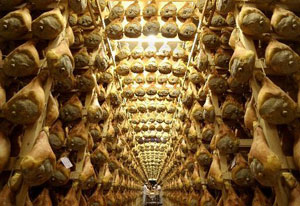
Canada is currently negotiating two major international trade agreements whose success may ultimately depend on the level of protection provided to Parma ham. While it may seem hard to believe, the Canada-European Union Comprehensive Economic and Trade Agreement (CETA) and the Anti-Counterfeiting Trade Agreement (ACTA) are both facing increasing opposition based on European demands to expand protection for "geographical indications."
Geographical indications (GI) are signs used on goods -- frequently food, wine, or spirits -- that have a specific geographical origin and are said to possess qualities, reputation or characteristics that are essentially attributable to that place of origin. Given the quality associated with the product, proponents of GI protection argue that it is needed to avoid consumer confusion as well as to protect legitimate producers.
Europe has the most extensive geographical indication protections in the world. These include Protected Designation of Origin (PDO, which covers agricultural products produced, processed and prepared in a given geographical area using recognized know-how), Protected Geographical Indication (PGI, which covers agricultural products linked to the geographical area), and Traditional Speciality Guaranteed (TSG, which highlights traditional character, either in the composition or means of production).
Could 'pizza' be next?
The net effect of the European system is that hundreds of items enjoy special legal protection. In fact, the system is so extensive that the Canadian Association of Importers and Exporters have expressed concern that CETA could lead to new restrictions on the use of words such as "pizza" or "feta."
The GI protection under European law frequently clashes with the fact that for many consumers the GI has ceased to be associated with a particular geographic region and is instead viewed as a generic term for a particular type of product.
For example, many consumers might not associate champagne wines with a specific region in France, but rather to a particular kind of white wine. Similarly, the term "cologne," which is widely used to refer to perfumed fragrances, actually has its origins in the German city of Cologne.
Canadian courts have grappled with a number of geographical indications cases in the past, including an attempt by the Italian authority that regulates "Parma" for cured ham to stop Maple Leaf Meats from using the Parma trademark for some of its meat products. The court sided with the Canadian producer, ruling that consumers would not associate its meat with products originating in Parma, Italy.
EU draws a "red line"
Over the past two decades, Canada has made significant changes to its own geographical indications system. These include taking many popular terms -- including Chablis, Champagne, Port, Bordeaux, Burgundy, Medoc, Grappa, Schnapps and Sambuca -- off a generic list so that they could enjoy new geographical indication protection.
The irony with the Europe's zeal to protect geographical indications within trade agreements is that the effect may be to stifle trade by stopping foreign competitors from marketing similar products using names that are understood by consumers as generic descriptions.
The latest round of CETA negotiations took place last week in Brussels, with the GI issue (along with protections for industrial designs that cover the fashion industry) a top priority for the European delegation. The Canadian government unsurprisingly faces some opposition to the demands from domestic producers.
Similarly, the ACTA negotiations, which have become increasingly acrimonious, have hit a major roadblock with the Europeans demanding extensive new enforcement powers -- including criminal and civil penalties -- for GI violations. The U.S. and Canada have been resisting the demand, leading Karel de Gucht, a European commissioner, to warn last week that this was a "red line" issue that could cause the EU to rethink the merits of the entire treaty. ![]()
Read more: Politics, Labour + Industry
















Tyee Commenting Guidelines
Comments that violate guidelines risk being deleted, and violations may result in a temporary or permanent user ban. Maintain the spirit of good conversation to stay in the discussion.
*Please note The Tyee is not a forum for spreading misinformation about COVID-19, denying its existence or minimizing its risk to public health.
Do:
Do not: